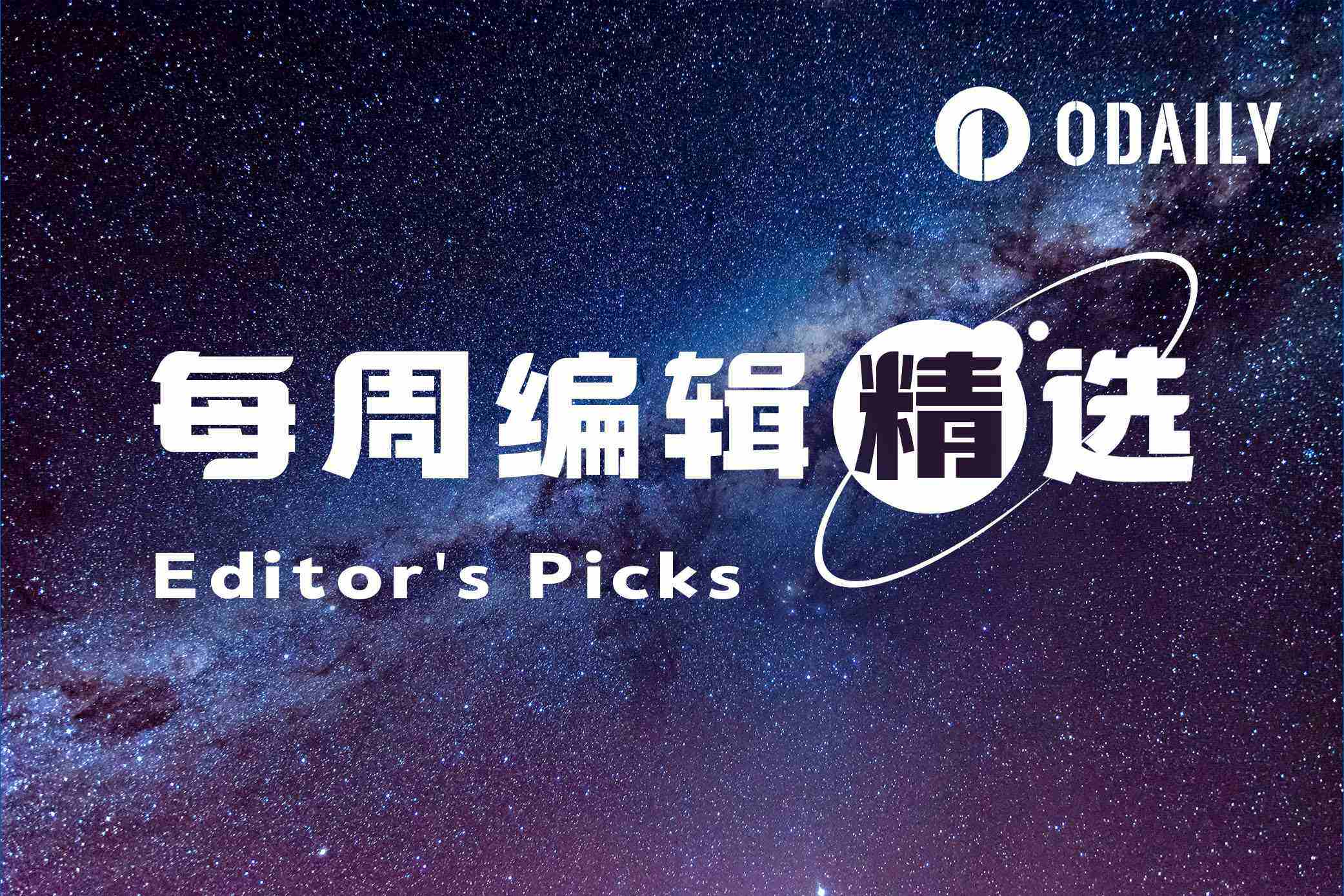"On-chain ownership" loses out to "front-end dominance"? Hyperliquid's $500,000 token naming dispute.
- 核心观点:Hyperliquid前端命名权争议暴露中心化风险。
- 关键要素:
- Mon Protocol花费50万美元竞得MON代币代码。
- Hyperliquid前端强制将MON显示权转给Monad。
- 团队以"用户保护"为由解释前端修改权。
- 市场影响:削弱生态项目方对去中心化承诺信任。
- 时效性标注:中期影响
Hyperliquid is undoubtedly the brightest star in the cryptocurrency world this year.
However, a recent dispute over "naming rights" has sparked considerable debate and disagreement within the community.
If you spend $500,000 to buy a token (Ticker) on Hyperliquid, would you assume it belongs to you? The Hyperliquid team recently demonstrated with their actions that it belongs to you on the blockchain, but is under their control on the web.
$MON, bought for $500,000, just vanished?
The controversy originated in January of this year. At that time, Mon Protocol, the backer of the GameFi project Pixelmon, participated in Hyperliquid's HIP-1 spot listing auction in order to attract the Hyperliquid community.
Here's a brief explanation of Hyperliquid's spot listing mechanism. Unlike centralized exchanges' "listing fees" or "bribes," HL uses a Dutch auction system for listing. This is a permissionless process where projects compete by paying gas fees (initially USDC, later HYPE) to secure listing status.
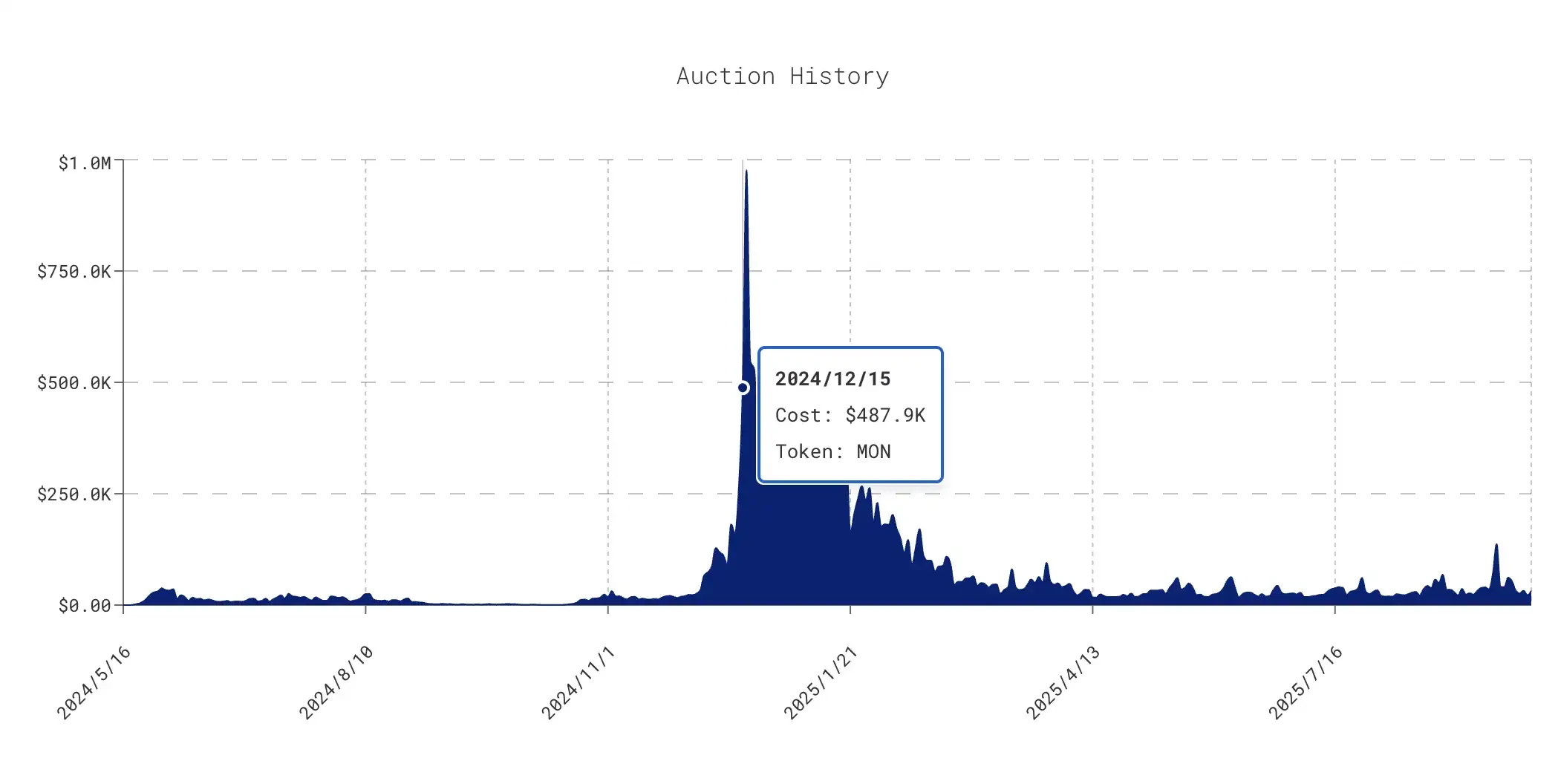 Source: https://data.asxn.xyz/dashboard/hl-auctions
Source: https://data.asxn.xyz/dashboard/hl-auctions
Mon Protocol spent approximately $500,000 to win the bid at a high price and successfully registered the $MON Ticker on the blockchain.
At the time, Hyperliquid was still in its early stages, and the spot bridging project Unit had not yet been launched. Apart from large-cap assets such as HYPE and PURR, other spot trading pairs generally lacked liquidity. Mon Protocol's tokens performed almost identically to Rug after their launch.
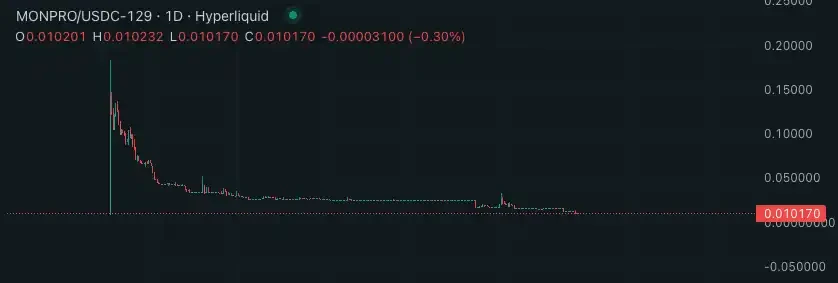
Monad, a highly anticipated "top-tier project," also has its token called $MON. However, when Monad was listed on Hyperliquid, an awkward situation arose: the Hyperliquid team directly modified the front-end display, forcibly renaming Mon Protocol to "MONPRO," while Monad directly used the name "MON."

Although on the blockchain, Pixelmon's token code is still MON, and Monad is actually UMON, at the front end where users perceive it most directly, the "status" that Pixelmon bought for $500,000 was instantly stripped away.
User safety or traffic supremacy?
This move quickly sparked a heated debate on Twitter. Trader Akku bluntly stated that the decision was "extremely disappointing."
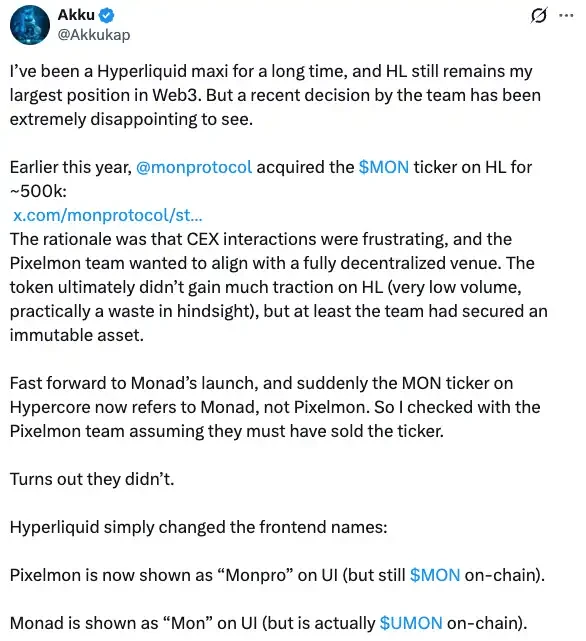 "Pixelmon spent $500,000 to buy something that the frontend can override at will, while Monad (or its closely related Unit) can get that visible name for free... Does this mean: you can buy code on the chain, but we decide what the frontend displays based on who we're on good terms with?"
"Pixelmon spent $500,000 to buy something that the frontend can override at will, while Monad (or its closely related Unit) can get that visible name for free... Does this mean: you can buy code on the chain, but we decide what the frontend displays based on who we're on good terms with?"
In response to the criticism, Hyperliquid's core member xulian offered a very "Web2" explanation:
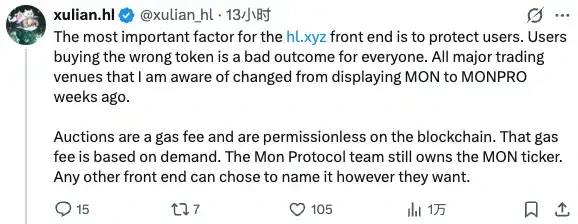 "The most important factor for front-end development is protecting users. A user buying the wrong token is bad for everyone. As far as I know, all major exchanges changed MON to MONPRO a few weeks ago. Auctions are on-chain gas fees, and the Mon Protocol team still owns the MON ticket. Any other front-end can name itself whatever it wants."
"The most important factor for front-end development is protecting users. A user buying the wrong token is bad for everyone. As far as I know, all major exchanges changed MON to MONPRO a few weeks ago. Auctions are on-chain gas fees, and the Mon Protocol team still owns the MON ticket. Any other front-end can name itself whatever it wants."
This translates to: To prevent user confusion, we sacrificed the original Ticker owner's display rights.
Another party involved in this incident, the Unit team (responsible for spot bridging of Monad tokens on HL) which has close ties to Hyperliquid, was also caught in the controversy because of acquiring this name. Unit member Shadow (0xmev) was forced to come out and clarify:
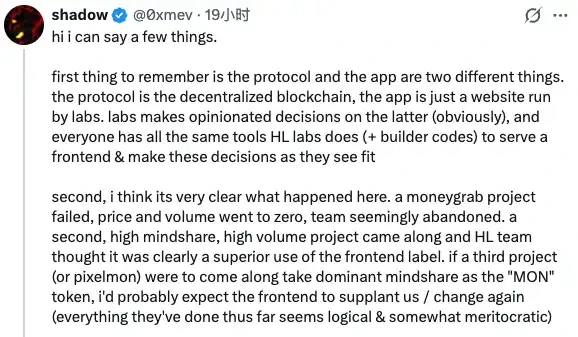 "The protocol and the app are two different things. Hyperliquid Labs has the final say on the app. It's clear: one project (Mon Protocol) failed to attract buyers from the Hyperliquid community, and its price went to zero; the other is a high-profile, high-volume project (Monad). Labs felt that giving the name to the latter was a better presentation choice."
"The protocol and the app are two different things. Hyperliquid Labs has the final say on the app. It's clear: one project (Mon Protocol) failed to attract buyers from the Hyperliquid community, and its price went to zero; the other is a high-profile, high-volume project (Monad). Labs felt that giving the name to the latter was a better presentation choice."
Community Deep Fryer
While the official explanation is logically sound (the front-end does indeed belong to Hyperliquid Labs), the community is not convinced from an emotional and business ethics standpoint.
Akku countered that the initial marketing of the spot auction led everyone to assume that "spot listing = front-end display," and now playing word games by saying "on-chain only" is nothing short of a marketing scam. He believes that if Monad doesn't want conflict, it should change its name itself instead of depriving early adopters of their rights.
Ramen's viewpoint represents the sentiments of the majority of onlookers:
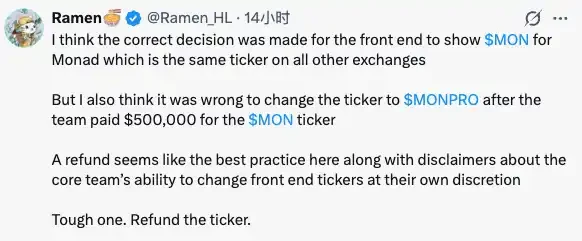 "To avoid confusion, showing $MON to Monad might be correct, but forcing a name change after someone has paid $500,000 is wrong. A refund seems to be the best course of action."
"To avoid confusion, showing $MON to Monad might be correct, but forcing a name change after someone has paid $500,000 is wrong. A refund seems to be the best course of action."
Of course, there are also voices defending HL. Users aaalex.hl and altoshi insist that "the protocol is not the same as the front end" and that "Hyperliquid is a business, not a charity," arguing that as long as the on-chain contract remains unchanged, it does not violate the principle of decentralization.
Arrogance is a byproduct of success.
Hyperliquid did nothing wrong. They do indeed have absolute control over the hyperliquid.xyz domain and have the right to adjust the display logic for user experience. Monad's size and popularity far exceed Pixelmon's. Giving the MON code to Monad not only serves the platform's interests but also protects unsuspecting users from buying illiquid tokens with the same name.
This seemingly reasonable "arbitrary decision" actually makes some ecological builders feel uneasy.
Absolute right of interpretation
Another story revealed by Shadow, a team member of Unit, in his reply is perhaps more thought-provoking than the name change itself:
 "We built the entire brand (tradexyz) from scratch precisely because we had no influence over Labs' front-end decisions. They ultimately decided to launch HIP-3 on their official front-end immediately after we finished and announced the entire project—which effectively destroyed the competitive advantage we had spent a lot of time building. But we won't complain about it; we will move on."
"We built the entire brand (tradexyz) from scratch precisely because we had no influence over Labs' front-end decisions. They ultimately decided to launch HIP-3 on their official front-end immediately after we finished and announced the entire project—which effectively destroyed the competitive advantage we had spent a lot of time building. But we won't complain about it; we will move on."
If even "core" systems like Unit are at risk of being "leeched" by the official front-end team, how can small projects with no background find a sense of security in such an ecosystem?
A rigid approach
Hyperliquid's "arrogance" towards capital is a major factor in its winning over the community's fervent support. They rejected investment from top VCs, refused to pay listing fees to CEXs, and insisted on fair distribution.
But as Akku pointed out, even refunding the auction fees from back then, or reaching some kind of compensation agreement with the Pixelmon team beforehand, would have made the whole thing much more dignified. The current approach not only hurts early supporters (even if it's a failed project), but also sends a message that "whoever is bigger is right."
Hyperliquid remains one of the best Perp DEXs on the market, and its technical prowess is undeniable. However, after reaching the top, how to avoid becoming the "autocratic giant" it once sought to disrupt is perhaps a question the Hyperliquid team needs to consider.
Water can carry a boat, but it can also capsize it. The "arrogance" that the community prefers is the unyielding spirit in the face of power, not the willfulness in the face of rules.


